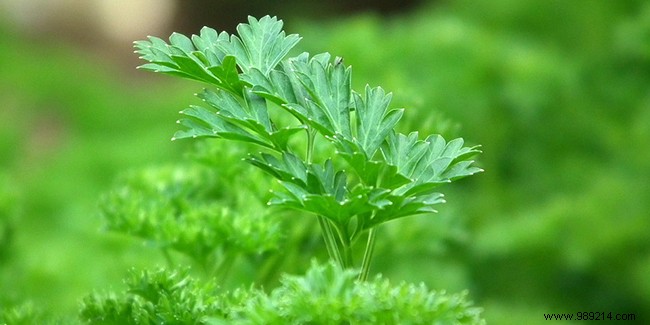
The parsley is classified in the Umbelliferae and used by man for more than 5,000 years. In Ancient Greece, it was used for funeral rites or to crown the winners of the Games in Corinth. The Romans also used parsley after orgies to mask the foul smell of their foul breath laden with excess alcohol. Until the Middle Ages, parsley, whether flat or curly, was used for its medicinal properties . In the 15th century, it was used in cooking as an aromatic herb. Currently, parsley is once again becoming a medicinal herb for its many medicinal and culinary properties.
Parsley is one of the herbs in the human diet. It provides quantities of antioxidants , but they are minimal and this contribution is not sufficient on its own to meet our needs. Studies on the subject have been carried out on animals from extracts, but not on humans. It is therefore difficult to assess precisely what the health effects are based on the quantities ingested. However, parsley is recognized for several health benefits, here are the main elements.
Antioxidants are very important in the human body, as they help to reduce certain damage emanating from free radicals . They are thus very involved in cardiovascular diseases, diseases related to aging and certain cancers . Adding parsley to food then makes sense, as it contains antioxidants in the form of:
Apigenin is a flavonoid found in parsley and is recognized for its anticarcinogenic and antimutagenic effects in vitro in the animal. The apigenin contained in parsley is absorbed by the human body in a variable way. It thus suggests to scientists that it could help reduce free radicals in some people.
These two compounds are in appreciable quantity in parsley. They are also very good antioxidants . Thus, parsley ranks third in carotenoid content among 18 fruits and vegetables after carrots and watercress.
The Romans already used parsley in ancient times to fight against bad breath . This reputation is real. Parsley captures sulfur compounds from the mouth and intestine, such as those of garlic and its derivatives, and thus greatly reduces bad breath when chewing a small piece of it. Three leaves should be chewed after the meal.
Parsley used in decoction is an excellent diuretic . It can help flush when a person is prone to water retention or experiences excess uric acid. To make a decoction, pour a teaspoon of parsley roots into a cup of cold water, boil the mixture for five minutes and infuse for ten minutes. Strain and the decoction is ready. Two to four cups a day for three weeks provide a cure. A break of one week must be observed before resuming a new cure if necessary.
Parsley is still very useful to fight against certain digestion disorders . You should make an infusion with a large spoon of dried parsley leaves in a cup of boiling water and let it steep for five minutes. The cure is carried out for three weeks at the rate of two to four cups per day. A week's break is mandatory before starting a second cure if necessary.
Parsley used in juice stimulates the immune system and to fight against a possible beginning of anemia. To make this juice, mix a bunch of fresh parsley with a stalk of celery, half a cucumber, the juice of half a lemon and two handfuls of baby spinach. In winter, it is recommended to drink this cocktail every day.
Parsley still helps to have a pretty complexion . Put a bunch of fresh parsley in a pan of cold water and bring to a boil for three to four minutes. Leave to cool and filter. Once the lotion is cold, it can be applied to the face using a cotton ball. This lotion will keep in the fridge for a few days.
Parsley is also rich in vitamin K which helps in blood clotting. Be careful if you have anticoagulant treatment. Pregnant women should also avoid consuming parsley as a cure. In any case, if you use parsley in addition to a treatment or even if you want to start a cure, you should always seek the advice of your doctor .